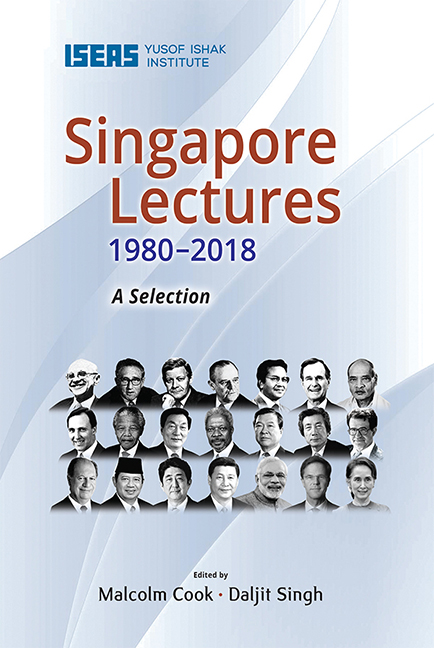Book contents
- Frontmatter
- Contents
- Introduction
- 1 The Invisible Hand in Economics and Politics
- 2 American Foreign Policy: A Global View
- 3 The Soviet Union: Challenges and Responses as Seen from the European Point of View
- 4 Trends in the International Financial System
- 5 Regionalism, Globalism and Spheres of Influence: ASEAN and the Challenge of Change into the 21st Century
- 6 US Policy in the Asia-Pacific Region: Meeting the Challenges of the Post-Cold War Era
- 7 India and the Asia-Pacific: Forging a New Relationship
- 8 Australia, Asia and the New Regionalism
- 9 South and Southern Africa into the Next Century
- 10 China and Asia in the New Century
- 11 Global Values: The United Nations and the Rule of Law in the 21st Century
- 12 Peace on the Korean Peninsula and East Asia
- 13 Japan and ASEAN in East Asia: A Sincere and Open Partnership
- 14 EU and Asia: Sharing Diversity in an Inter-regional Partnership
- 15 Global Challenges in the 21st Century: A View from Chile
- 16 Indonesia: The Challenge of Change
- 17 Japan and ASEAN, Always in Tandem: Towards a More Advantageous Win-Win Relationship through My “Three Arrows”
- 18 Forging a Strong Partnership to Enhance Prosperity of Asia
- 19 India’s Singapore Story
- 20 The Netherlands, Singapore, Our Regions, Our World: Connecting Our Common Future
- 21 Democratic Transition in Myanmar: Challenges and the Way Forward
- The Singapore Lecture Series
- The Editors
2 - American Foreign Policy: A Global View
Published online by Cambridge University Press: 09 October 2021
- Frontmatter
- Contents
- Introduction
- 1 The Invisible Hand in Economics and Politics
- 2 American Foreign Policy: A Global View
- 3 The Soviet Union: Challenges and Responses as Seen from the European Point of View
- 4 Trends in the International Financial System
- 5 Regionalism, Globalism and Spheres of Influence: ASEAN and the Challenge of Change into the 21st Century
- 6 US Policy in the Asia-Pacific Region: Meeting the Challenges of the Post-Cold War Era
- 7 India and the Asia-Pacific: Forging a New Relationship
- 8 Australia, Asia and the New Regionalism
- 9 South and Southern Africa into the Next Century
- 10 China and Asia in the New Century
- 11 Global Values: The United Nations and the Rule of Law in the 21st Century
- 12 Peace on the Korean Peninsula and East Asia
- 13 Japan and ASEAN in East Asia: A Sincere and Open Partnership
- 14 EU and Asia: Sharing Diversity in an Inter-regional Partnership
- 15 Global Challenges in the 21st Century: A View from Chile
- 16 Indonesia: The Challenge of Change
- 17 Japan and ASEAN, Always in Tandem: Towards a More Advantageous Win-Win Relationship through My “Three Arrows”
- 18 Forging a Strong Partnership to Enhance Prosperity of Asia
- 19 India’s Singapore Story
- 20 The Netherlands, Singapore, Our Regions, Our World: Connecting Our Common Future
- 21 Democratic Transition in Myanmar: Challenges and the Way Forward
- The Singapore Lecture Series
- The Editors
Summary
On 30 October 1981, Dr Henry Kissinger, the former US Secretary of State, gave the 2nd Singapore Lecture after being welcomed by Singapore's Deputy Prime Minister S. Rajaratnam. Dr Kissinger was the second American and first former government official to give a Singapore Lecture following Professor Milton Friedman in 1980. His lecture analyses the unique position of the US globally in the post-World War II era and the challenges this poses for US foreign policy. This is followed by his observations on communism and the Soviet Union and US relations with the developing world, including a critique of the non-aligned movement's criticisms of the US. The lecture serves an excellent primer for the domestic and global dimensions of US post-war foreign and security policy.
Mr Deputy Prime Minister, Excellencies, Ladies and Gentlemen,
I accepted the invitation to speak here with great eagerness. Although Singapore is a relatively small country in terms of population, I must say that in terms of its influence—when I was in office—under the distinguished leadership that you have, Singapore has always played a very significant role.
I want to take this opportunity to tell you how important for my own intellectual development and understanding of this area has been the constant friendship, and the occasional scolding, we have received from your Prime Minister. The first time I met your Prime Minister, he was telling my academic colleagues at Harvard that they didn't know what they were talking about. Later, he appeared from time to time in Washington, when I was in office, to recall us to our duty. So I am here as an admirer of what has been accomplished here, and as a friend of your leaders.
I believe that the Deputy Prime Minister has posed exactly the right question for our period and exactly the question that the United States must answer if free societies are to survive. The key question of our period is whether the United States can muster sufficient understanding and sufficient resolution to maintain and to prevail in the contest that is now taking place.
For the emotional balance of those members of the American Embassy who may be here, I would like to stress that I speak in my private capacity, and that you must receive the official formulations from our Ambassador and his outstanding staff.
- Type
- Chapter
- Information
- Singapore Lectures 1980-2018 , pp. 19 - 36Publisher: ISEAS–Yusof Ishak InstitutePrint publication year: 2020



